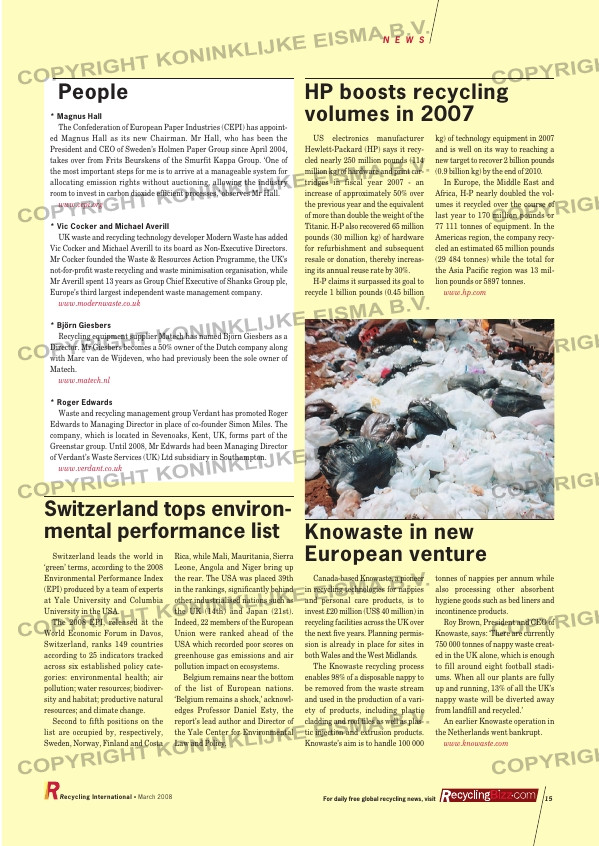Page 15 from: March 2008

N E W S
Recycling International • March 2008 15For daily free global recycling news, visit
* Magnus Hall
The Confederation of European Paper Industries (CEPI) has appoint-
ed Magnus Hall as its new Chairman. Mr Hall, who has been the
President and CEO of Sweden’s Holmen Paper Group since April 2004,
takes over from Frits Beurskens of the Smurfit Kappa Group. ‘One of
the most important steps for me is to arrive at a manageable system for
allocating emission rights without auctioning, allowing the industry
room to invest in carbon dioxide efficient processes,’ observes Mr Hall.
www.cepi.org
* Vic Cocker and Michael Averill
UK waste and recycling technology developer Modern Waste has added
Vic Cocker and Michael Averill to its board as Non-Executive Directors.
Mr Cocker founded the Waste & Resources Action Programme, the UK’s
not-for-profit waste recycling and waste minimisation organisation, while
Mr Averill spent 13 years as Group Chief Executive of Shanks Group plc,
Europe’s third largest independent waste management company.
www.modernwaste.co.uk
* Björn Giesbers
Recycling equipment supplier Matech has named Björn Giesbers as a
Director. Mr Giesbers becomes a 50% owner of the Dutch company along
with Marc van de Wijdeven, who had previously been the sole owner of
Matech.
www.matech.nl
* Roger Edwards
Waste and recycling management group Verdant has promoted Roger
Edwards to Managing Director in place of co-founder Simon Miles. The
company, which is located in Sevenoaks, Kent, UK, forms part of the
Greenstar group. Until 2008, Mr Edwards had been Managing Director
of Verdant’s Waste Services (UK) Ltd subsidiary in Southampton.
www.verdant.co.uk
People
Switzerland tops environ-
mental performance list
Switzerland leads the world in
‘green’ terms, according to the 2008
Environmental Performance Index
(EPI) produced by a team of experts
at Yale University and Columbia
University in the USA.
The 2008 EPI, released at the
World Economic Forum in Davos,
Switzerland, ranks 149 countries
according to 25 indicators tracked
across six established policy cate-
gories: environmental health; air
pollution; water resources; biodiver-
sity and habitat; productive natural
resources; and climate change.
Second to fifth positions on the
list are occupied by, respectively,
Sweden, Norway, Finland and Costa
Rica, while Mali, Mauritania, Sierra
Leone, Angola and Niger bring up
the rear. The USA was placed 39th
in the rankings, significantly behind
other industrialised nations such as
the UK (14th) and Japan (21st).
Indeed, 22 members of the European
Union were ranked ahead of the
USA which recorded poor scores on
greenhouse gas emissions and air
pollution impact on ecosystems.
Belgium remains near the bottom
of the list of European nations.
‘Belgium remains a shock,’ acknowl-
edges Professor Daniel Esty, the
report’s lead author and Director of
the Yale Center for Environmental
Law and Policy.
HP boosts recycling
volumes in 2007
US electronics manufacturer
Hewlett-Packard (HP) says it recy-
cled nearly 250 million pounds (114
million kg) of hardware and print car-
tridges in fiscal year 2007 – an
increase of approximately 50% over
the previous year and the equivalent
of more than double the weight of the
Titanic. H-P also recovered 65 million
pounds (30 million kg) of hardware
for refurbishment and subsequent
resale or donation, thereby increas-
ing its annual reuse rate by 30%.
H-P claims it surpassed its goal to
recycle 1 billion pounds (0.45 billion
kg) of technology equipment in 2007
and is well on its way to reaching a
new target to recover 2 billion pounds
(0.9 billion kg) by the end of 2010.
In Europe, the Middle East and
Africa, H-P nearly doubled the vol-
umes it recycled over the course of
last year to 170 million pounds or
77 111 tonnes of equipment. In the
Americas region, the company recy-
cled an estimated 65 million pounds
(29 484 tonnes) while the total for
the Asia Pacific region was 13 mil-
lion pounds or 5897 tonnes.
www.hp.com
Knowaste in new
European venture
Canada-based Knowaste, a pioneer
in recycling technologies for nappies
and personal care products, is to
invest £20 million (US$ 40 million) in
recycling facilities across the UK over
the next five years. Planning permis-
sion is already in place for sites in
both Wales and the West Midlands.
The Knowaste recycling process
enables 98% of a disposable nappy to
be removed from the waste stream
and used in the production of a vari-
ety of products, including plastic
cladding and roof tiles as well as plas-
tic injection and extrusion products.
Knowaste’s aim is to handle 100 000
tonnes of nappies per annum while
also processing other absorbent
hygiene goods such as bed liners and
incontinence products.
Roy Brown, President and CEO of
Knowaste, says: ‘There are currently
750 000 tonnes of nappy waste creat-
ed in the UK alone, which is enough
to fill around eight football stadi-
ums. When all our plants are fully
up and running, 13% of all the UK’s
nappy waste will be diverted away
from landfill and recycled.’
An earlier Knowaste operation in
the Netherlands went bankrupt.
www.knowaste.com
RI_018 NEWS:Opmaak 1 28-02-2008 11:45 Pagina 15



